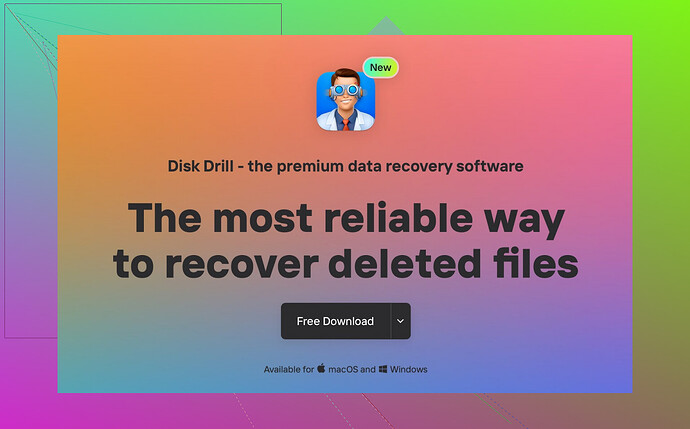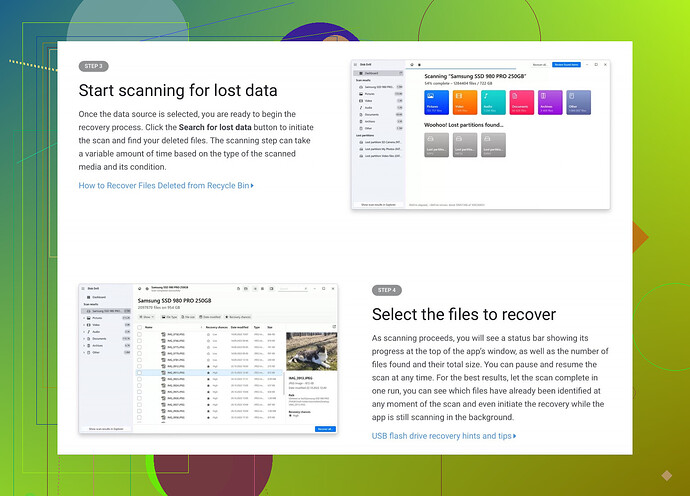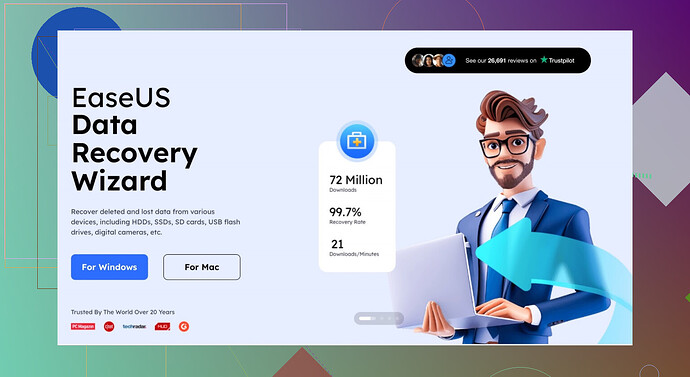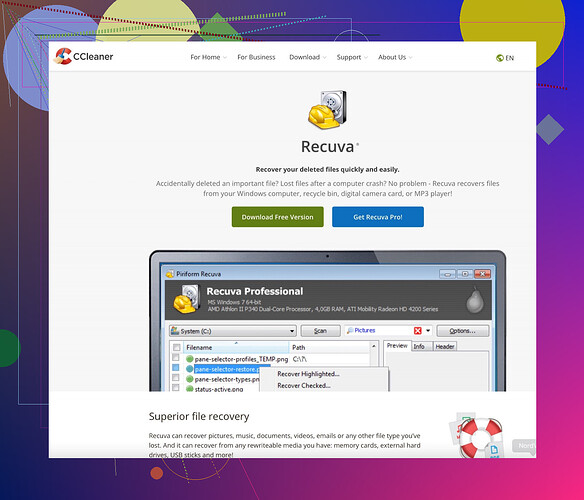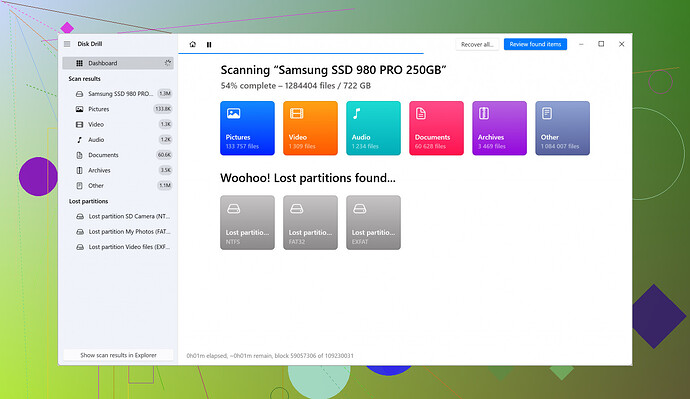I accidentally deleted some important files on my computer and need a reliable, free data recovery software to help me recover them. Does anyone have recommendations or experience with a good solution?
Top Data Recovery Tools for Mac and Windows (Free and Paid)
When disaster strikes and files vanish due to system errors, accidental deletions, or formatting issues, powerful data recovery software can be your savior. Below, we’ll walk you through some of the best tools available for retrieving lost data, covering free and premium options.
1. Disk Drill (Compatible with Mac & Windows)
Perks of Disk Drill
- Simple to navigate: Perfect for beginners seeking a seamless process.
- Broad file support: Can recover more than 400 file types.
- Added protections: Built-in tools like Recovery Vault prevent future data loss.
- Free recovery trial: Windows users can restore up to 500MB without charge.
Room for Improvement
- Mac limitations: Free version only previews files on macOS.
- Time-consuming deep scans: Deeper analysis may take longer.
- Pay-to-unlock features: Full recovery capability requires a license purchase.
Summary
Disk Drill is an intuitive, potent choice, offering excellent recovery support for both casual users and experts.
Explore Disk Drill’s official site | Check a Reddit review here
2. EaseUS Data Recovery Wizard (Both Mac & Windows Compatible)
Best Features
- Quick recovery process in 3 steps.
- AI-powered scanning delves deeper for complex file loss situations.
- Free option: Restore up to 2GB of data at no cost.
- Supports advanced scenarios: Lost partitions and RAW recovery are manageable.
Drawbacks
- Small free recovery limit: Inadequate for recovering large files.
- Sluggish during deep scans.
- Paid plan required for complete functionality.
Verdict
EaseUS is a straightforward and reliable tool, ideal for regular data recovery needs.
Check a Reddit user’s perspective here
3. Recuva (Exclusive to Windows Users)
What’s Great About It?
- Free unlimited recovery option (not common among tools).
- Compact and speedy operation.
- Portable version for external device recovery.
Setbacks
- No Mac support.
- Lacks advanced or sophisticated features.
- Not suitable for retrieving heavily corrupted files.
Wrap-Up
Recuva is an excellent budget-friendly choice for straightforward file recovery on Windows systems.
Read more on Reddit
4. Stellar Data Recovery (Available on Mac & Windows)
Pros
- Recovers photos, videos, emails, and a variety of file types.
- Compatible with many storage devices.
- Offers a free version for up to 1GB of recovery.
- Known for consistently strong recovery outcomes.
Cons
- Free recovery capped at only 1GB.
- Scanning efficiency may be slow.
- Advanced features locked behind expensive licenses.
Verdict
This versatile tool is highly effective for users who require professional-grade recovery features.
5. TestDisk & PhotoRec (Open-Source for Mac & Windows)
Key Benefits
- 100% free and open for public modification.
- Reputable for partition restoration and deep scans.
- Runs seamlessly across multiple platforms.
Limitations
- Text interface: Lacks a user-friendly GUI.
- Challenging for newbies: Requires expertise to navigate.
Final Thought
A practical choice for tech-savvy users experienced with command-line utilities.
6. R-Studio (Mac & Windows)
Advantages
- Regarded as one of the most advanced recovery programs available.
- Offers RAID and networked recovery, making it a go-to for critical setups.
- Extensive file-system compatibility.
Drawbacks
- Comes with a complex interface that may intimidate inexperienced users.
- No free tier available for significant restoration tasks.
Verdict
Optimal for IT professionals and those handling intricate data infrastructures.
7. Wondershare Recoverit (Mac & Windows)
Highlights
- User-friendly design makes recovery stress-free.
- Recognizes and recovers over 1000 file types.
- Dedicated tools for video-specific recovery and repair.
Weaknesses
- Only 500MB available free of charge.
- Sluggish performance during deeper recovery scans.
Takeaway
Recoverit makes a perfect companion for beginners, particularly for video-related tasks.
8. Ontrack EasyRecovery (For Mac & Windows)
Why Use This?
- Trusted by professionals in the data recovery space.
- Free bonus: Recover up to 1GB without payment.
- Includes RAID and email recovery with certain pricier plans.
Why Think Twice?
- Free tier restrictions: Max file size capped at 25MB per file.
- Higher-tier licenses can significantly increase costs.
Verdict
This software shines for mission-critical, professional scenarios but isn’t necessarily suitable for personal use.
9. Prosoft Data Rescue (Supports Mac & Windows)
Upsides
- Powerful performance and dependable results.
- Features unique drive cloning for recovering damaged drives.
- Tailored for Apple enthusiasts recovering lost macOS files.
Caveats
- Confusing pay-per-recovery pricing model.
- No option for a one-time lifetime license.
Verdict
This program is a steadfast choice for users intent on robust recovery.
10. MiniTool Power Data Recovery (For Windows-Only Users)
Strengths
- Friendly interface that’s easy to pick up.
- Allows 1GB of recovery at no cost.
- Perfect for basic recovery situations.
Weak Points
- Mac users are left out—it supports Windows exclusively.
- Cannot handle advanced file-loss predicaments.
Judgment
An excellent starter option for quick, low-complexity recovery tasks on Windows systems.
Final Recommendations
To make your choice easier:
- Beginner-Friendly Picks: Disk Drill, EaseUS, Wondershare Recoverit
- Best Free Solutions: Recuva (Windows) and TestDisk (Mac/Windows)
- Professional Needs: Disk Drill, R-Studio, Prosoft Data Rescue, Ontrack EasyRecovery
- Top Video Recovery Tools: Disk Drill, Wondershare Recoverit
For simple fixes, start with free options. If recovery complexity increases, upgrade to a premium tool for enhanced results.
Honestly, I hate to break it, but there’s no perfect answer to ‘best free data recovery software.’ It’s always a game of “how much data can you salvage before they slap you with a paywall.” But, from my experience, Disk Drill offers a decent balance—its free Windows version gives you up to 500MB recovery, which can be a lifesaver depending on the size of your files. Plus, it’s super user-friendly, unlike some clunky, outdated programs. Just make sure you don’t write new data to the drive; otherwise, you might say goodbye to your precious files for good.
That said, a competitor like Recuva only really works if you’re a Windows user; it’s free and unlimited, but forget about it if the files are highly corrupted. If you’re tech-savvy, give TestDisk and PhotoRec a try. They’re free and powerful, but if you’re not fluent in command-line language, you might feel like you’re trying to decode an alien transmission.
For larger recoveries, EaseUS often gets mentioned because it lets you recover up to 2GB, but full functionality is (surprise, surprise) locked behind a paid wall. So yeah, MikeAppsReviewer had a point listing all these tools, but let’s be real—the perfect ‘free’ option doesn’t exist. Be prepared for limitations unless you shell out cash.
In the end, try Disk Drill first—it’s beginner-friendly and gives a preview of what’s recoverable, so you’re not wasting time. Not entirely flawless, but better than most of the “free” peers out there.
I know the struggle of losing files—it’s like a digital horror movie. So, when it comes to free data recovery software, let’s not beat around the bush—it’s never completely ‘free’ if you’re hoping for full recovery without limitations. That said, there are a few decent options worth trying.
For a quick fix, Recuva is the one to start with if you’re on Windows. It’s free, and there’s no recovery limit, but let’s not kid ourselves—it’s basic. If your files are heavily damaged, Recuva will just shrug at you. It’s perfect if you’ve accidentally deleted files recently (and haven’t overwritten them).
Then there’s Disk Drill. Everyone praises it, and for good reason—it can recover up to 500MB on its free version for Windows users, and the interface is so clean even your grandma could use it. If you’re on Mac, however, the “free” part pretty much just lets you preview what’s recoverable. Still, for smaller files or a clean, hassle-free experience, this one gets my vote.
Now, if you’re swimming in tech-savviness, go for TestDisk & PhotoRec—it’s free and powerful, but it looks like software straight out of the ‘90s (and not in a nostalgic way). Using it feels like solving a Rubik’s Cube if the stickers kept falling off, but it’s worth it for deep recoveries without coughing up cash.
I saw @mikeappsreviewer and @sognonotturno hyping up EaseUS too—solid choice if you need up to 2GB of recovery, but anything more will ambush you with a paywall. Honestly, all these programs do that eventually, so don’t get your hopes up too high unless your lost files are tiny or you’re ready to pay.
One tip? Stop what you’re doing on the affected drive immediately—no downloads, no program installations directly onto it. Every action overwrites bits of data and torpedoes your recovery chances. Use another drive or USB for setups.
TL;DR: Start with Disk Drill if you’re on Windows for quick/easy recovery. If you’re broke AND technical, TestDisk it is. Good luck avoiding those sneaky paywalls!
Honestly, when it comes to choosing the best free data recovery software, it really boils down to your specific needs and tech comfort level. Let’s break this down without sugarcoating things.
If you’re on Windows, you should consider Recuva for its truly free unlimited recovery. But the catch? It’s pretty basic. If you’re dealing with corrupted files or need advanced scanning, don’t expect miracles here. It’s really only best for straightforward, recent deletions. On the other hand, Disk Drill might be a better overall option for its sleeker interface and broader file type support. Yes, the free version limits you to 500MB recovery (on Windows), but for smaller needs, it’s hard to beat in terms of ease of use and accuracy.
For Mac users, though, the word “free” becomes a bit questionable across platforms. With Disk Drill, macOS users can only preview recoverable files in the free version, which seems more like a teaser. That’s where something like TestDisk & PhotoRec comes into play. It’s completely free and crosses Mac/Windows boundaries but is challenging for non-tech-savvy folks. Its retro, text-based design can feel like bringing a hammer to brain surgery—not ideal if you’re looking for simplicity.
Not to knock EaseUS, but @sognonotturno and @mikeappsreviewer already pointed out its harsh 2GB recovery limit and paywall. It’s useful if your lost data is small, but if you’re going to hit that cap or deal with multiple drives, Disk Drill might feel like less of a tease, especially given its additional protection tools like Recovery Vault.
Pros of Disk Drill:
- Clean, intuitive UI, makes recovery super beginner-friendly.
- Recovers 400+ file types, so it’s diverse.
- Extra tools, like Recovery Vault, are a plus for future-proofing.
Cons of Disk Drill:
- Free version’s limits are frustrating on macOS.
- Deep scans can be slow, similar to other tools.
- To unlock full benefits, you’ll eventually pay up.
Suggestion? If you don’t mind navigating a clunky interface, TestDisk is 100% free and surprisingly robust for tougher recoveries. Otherwise, play it safe with Disk Drill’s trial for immediate needs. Skip EaseUS if you’re not interested in teasing out tiny recoveries. Pro tip: Don’t install the software on the affected drive; use another device to avoid overwriting anything critical.
Ultimately, free comes with compromises. If you’re serious about your files, have a strategy—and maybe a backup plan—before hitting any “Download” button.
